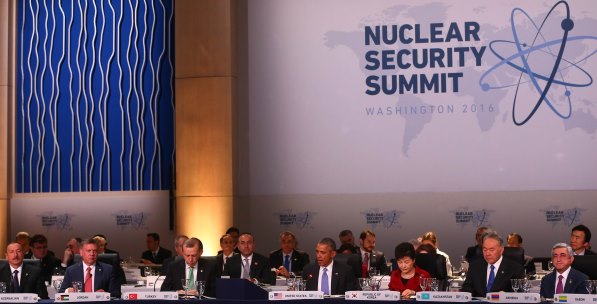
Nuclear Security, Terrorism and Human Security
The most important message that Turkey gave on various occasions was the danger of inconsistency in the war against terrorism. A second security issue that Turkey raised last week pertained to the human security dimension of international security.
Share
Last week was Nuclear Security Week in Washington, D.C. Many leaders from around the world arrived in Washington D.C. to discuss issues pertaining to non-proliferation and the security of the world's nuclear materials. In the summit and in statements after the summit, these issues were emphasized, and the international community expressed concern about the nuclear program of North Korea and the possibility of terrorist organizations gaining the capacity to build nuclear explosives.
Before the beginning of the summit, Turkish authorities, including President Recep Tayyip Erdogan, tried to raise two more issues pertaining to security. The first one was the increasing power and influence of some terrorist groups and the threat these organizations pose for the security of Turkey.
The most important message that Turkey gave on various occasions was the danger of inconsistency in the war against terrorism. As part of the international coalition against DAESH, the Turkish state has made it clear since the early days of the crises over DAESH that to tolerate different terrorist groups in order to defeat DAESH would create a significant security risk to Turkey and the future of the region. However, these concerns have mostly been ignored by its allies, most importantly by the United States. One of these terrorist groups, the People's Protection Units (YPG), a close affiliate of the PKK, has not only been tolerated, but also militarily supported by the United States during this period. This support emboldened the PKK, and operations in Syria became a major training ground for members of the terrorist organization. Although the U.S. administration made an artificial distinction between the YPG and the PKK from the very beginning, many knew that they were part of one single organization. In particular, this connection became more obvious with the recent terrorist attacks by the PKK in which the attackers turned out to be in Syria at some point. While Turkish authorities in their various meetings were trying to explain the absurdity of this distinction, the tone has almost reached a point of frustration. To support a terrorist organization that fights against an ally, which is a major partner in the fight against DAESH, has created a major crisis of confidence between the two countries and may generate a major setback for the global fight against terrorism.
A second security issue that Turkey raised last week pertained to the human security dimension of international security. On different platforms, Turkey tried to raise awareness about the Syrian refugee crisis, which has so far generated almost 5 million refugees and many more internally displaced. In the absence of an international commitment to handle this major risk, the Syrian people are greatly endangered. Tens of thousands of them have died either trying to flee the country or trying to reach European shores.
For almost five years, Turkish authorities have raised the issue of establishing a safe zone in the north of the country to protect Syrian people from Syrian regime airstrikes. However, the lack of willingness on the part of the international community in regards to building this safe zone has generated a major humanitarian catastrophe.
Although after the Aylan Kurdi incident, the international community's sensitivity to the issue increased dramatically, attempts by Western countries to fix this problem is less than sufficient at this point.
As mentioned above, Turkey raised both of these issues regarding security in Washington, D.C. last week. Although the threat of nuclear proliferation is obvious, it is not the only threat that endangers the lives and security of the people of the world. A more collective, consistent and comprehensive approach to security is necessary to protect human beings in different parts of the world.
[Daily Sabah, April 4, 2016]
Tags »
Related Articles






